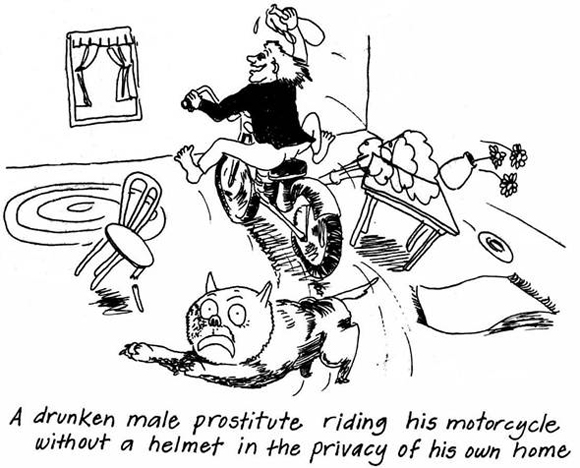Part 3: Applying the Harm Principle
Mill discusses several cases of applying the harm principle. Each case brings up a special challenge for the harm principle. When examining these cases, students should be aware that there may exist a distinction between what actions the harm principle as stated would indicate and what Mill himself says. In this sense, we may interpret some of Mill's answers as backing away from the conclusions implied by the harm principle itself. This will become evident in Case #5.
Mill's Cases
Case #1: Polygamy
Mill defends polygamy between consenting adults. He finds it morally deficient, but legally permissible so long as it is based upon informed consent of rational adults. Do you agree?
Case #2: Bob the College Student
Bob, like many college students, likes to go drinking. Though  drinking itself is not a harm to others, Bob ends up getting in regular bar fights after a night of drinking. Everyone around Bob (including the police and bartenders) is aware of his propensity to become violent when he drinks. Is there any justification for preventing Bob from drinking?
drinking itself is not a harm to others, Bob ends up getting in regular bar fights after a night of drinking. Everyone around Bob (including the police and bartenders) is aware of his propensity to become violent when he drinks. Is there any justification for preventing Bob from drinking?
Mill would argue that it would then be appropriate for society to limit Bob's future drinking due to his past behavior. In other words, Mill thinks that an individual's protection from interference is forfeited when an otherwise self-regarding behavior (like drinking) continually leads to an other-regarding behavior (fighting when drunk). This means that society cannot prevent drinking (because not every drinker is like Bob), but society can prevent or limit anyone like Bob from drinking.
Case #3: Liquor Laws
 The state decides to pass two new liquor laws: First, a law banning the sale of liquor on Sundays. Second, a law taxing liquor more than other goods in order to deter people from drinking because it is bad for them. Notice that these law do not prevent drinking; they only make drinking more expensive and alcohol harder to obtain. Are either of these laws acceptable according to the harm principle?
The state decides to pass two new liquor laws: First, a law banning the sale of liquor on Sundays. Second, a law taxing liquor more than other goods in order to deter people from drinking because it is bad for them. Notice that these law do not prevent drinking; they only make drinking more expensive and alcohol harder to obtain. Are either of these laws acceptable according to the harm principle?
Mill argues that they are not. Society is only justified in making a product more expensive or difficult to obtain if it were justified in banning the product all together. Mill then would oppose restricting the sale of liquor on Sunday and higher taxes on alcohol, if those taxes are imposed in order to make it harder to obtain.
 Case #4: The Jogger and the Bridge
Case #4: The Jogger and the Bridge
You are standing near a bridge that you know to be unsafe such that anyone crossing will likely fall to their death. For some reason there is no sign warning people of this (it was likely stolen as a prank). You see a jogger about to cross the bridge who is wearing headphones so they cannot hear your warning.
Are you justified in physically stopping the person from crossing the bridge in order to warn them? Mill claims that you are justified in stopping them and warning them of the dangerous bridge. This is because liberty is about doing what you want to do; and in this sort of case, we can assume that the person does not want to fall to their death. We are therefore justified in stopping them to inform them of the danger that they do not know about.
Case #5: Slavery
Suppose a rational adult decides to sell themselves into slavery. Does the harm principle prevent us from stopping this action? Taking the harm principle as written, we might conclude that a rational adult has the right to sell themselves into slavery. However, Mill says we can prevent this sale. Mill holds that the whole point of the harm principle is to preserve a person's liberty. As a result, if we allow someone to sell themselves into slavery we allow them to sacrifice all possibility of their future liberty. In this case Mill admits we ought prevent the sale even if it is a self-regarding action. Though this seems a rare case, it may have implications for questions of drug use and suicide.
Other Cases to Consider
Now that we have examined the cases that Mill discussed, here are some thought cases for you to consider:
Case #6: The Motorcycling Neighbor
You have a neighbor who has a large backyard with a 10-foot high, 4-foot thick brick wall. Only by peering out of the top of your attic window can you see what goes on in his backyard. Every Friday night from 6-8 pm he goes into his backyard, guzzles a bottle of Jack Daniels, strips buck naked, hops on his motorcycle, and zips around his backyard at high speed without a helmet. This is very dangerous behavior for your single neighbor. Do we have any justification for preventing this action according to the harm principle? What if your neighbor had ten of his friends (all rational consenting adults) over to drink and ride their motorcycles in the same fashion?
Exercising Liberty According to Mill's Harm Principle?

 Case #7: Saturday Whips and Chains
Case #7: Saturday Whips and Chains
On Saturday evening (after his Friday night cycle ride), your neighbor has a group of 20 rational consenting adults over to his house. They all go into his basement, break out their leather outfits, whips, and chains, and engage in a rough sex orgy. There is certain harm to others here (whips and chains do hurt), but do we have a justification to prevent this activity according to the harm principle? Would your answer change if some or all of the participants paid the host a fee to participate in the festivities? This would be only a step away from prostitution; would we have any grounds to prevent even this according to the harm principle?
Case #8: Homegrown and Pink Floyd
On Sunday, after an exhausting weekend, your neighbor decides to take it easy. He  goes into his attic with a pizza and some Doritos, turns on his lava lamp and black lights, puts Pink Floyd's Dark Side of the Moon on the CD player, then goes over to his attic "garden" and rolls up some homegrown marijuana and spends the next six hours smoking, eating munchies, and giggling in his attic. He has a good ventilation system so there is no "second hand smoke" blowing into your yard.
goes into his attic with a pizza and some Doritos, turns on his lava lamp and black lights, puts Pink Floyd's Dark Side of the Moon on the CD player, then goes over to his attic "garden" and rolls up some homegrown marijuana and spends the next six hours smoking, eating munchies, and giggling in his attic. He has a good ventilation system so there is no "second hand smoke" blowing into your yard.
Should we restrict his liberty in this case? How does your answer square with the law in this case? (We will be returning to the issue of drugs in the next module.)
Case #9: The Hanging Tree
On Monday evening you notice your neighbor is about to hang himself from a tree in his yard (you're always nosey and peek to see what he is up to). After a brief conversation you are convinced that he is rational, of sound mind, and fully aware of what he is about to do. He is also not under the influence of any drugs and has no wife or dependent children that he is obligated to support. He is certain he wants to commit suicide and is about to do so. Do you have any justification for stopping him according to the harm principle? How might Mill respond?
Thought Question: Mill on Discrimination?
We have a right, also, in various ways to act upon our unfavorable opinion of any one, not to the
oppression of his individuality, but in the exercise of ours. We are not bound, for example, to seek his
society; we have a right to avoid it (though not to parade the avoidance), for we have a right to choose
the society most acceptable to us. We have a right, and it may be our duty to caution others against him,
if we think his example or conversation likely to have a pernicious effect on those with whom he
associates. We may give others a preference over him in optional good offices, except those which tend
to his improvement. In these various modes a person may suffer very severe penalties at the hands of
others, for faults which directly concern only himself; but he suffers these penalties only in so far as
they are the natural, and as it were, the spontaneous consequences of the faults themselves, not because
they are purposely inflicted on him for the sake of punishment. A person who shows rashness obstinacy,
self-conceit—who cannot live within moderate means—who cannot restrain himself from hurtful
indulgences—who pursues animal pleasure at the expense of those of feelings and intellect—
must expect to be lowered in the opinions of others, and to have a less share of their favorable
sentiments, but of this he has no right to complain, unless he has merited their favor by special
excellence in his social relations, and has thus established a title to their good offices, which is
not affected by his demerits towards himself.
What is Mill suggesting about our ability to discriminate against those whom we find offensive or full of
vice? Do you agree with him?